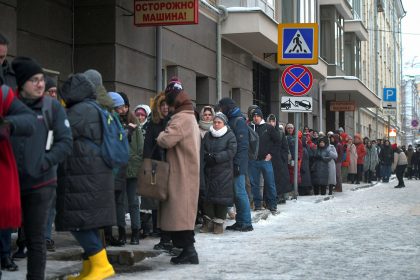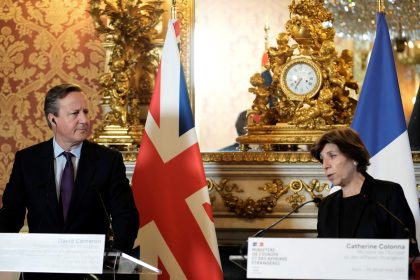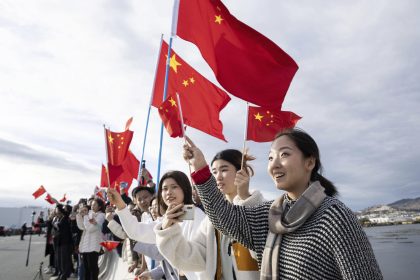Assessing U.S. Canadian Border Policy’s Future Effects

WASHINGTON – Canada is not usually at the center of debate on U.S. immigration, but policy changes due to COVID-19 have atypically limited travel to Canada and affected the United States’ and Canada’s control of the movement of people and goods across their shared border in ways that may have dramatic future effect.
To manage the outbreak of coronavirus, Canada’s government issued guidance and restrictions that affect immigration into the foreseeable future. A ban on non-essential travel at the border turned back most asylum seekers arriving from the U.S., and refugee settlement, processing of work permits, and permanent residency applications were suspended. International students looking to virtually attend Canadian universities were welcomed.
“There’s always an ebb and flow with regards to immigration,” Richard Sanders, global fellow and former member of the Senior Foreign Service of the U.S. Department of State said at a virtual conference of the Wilson Center, a bipartisan policy forum, discussing the effects of these policies on cross border migration.
“The U.S. and Canada have, in spite of their similarities, different immigration regimes and also somewhat different circumstances regarding immigration,” Sanders added.
Much like in the United States, legislation in the 1960s and 1970s laid the groundwork for the immigration regime Canada has today. In 1967, Ottawa introduced a points-based system for evaluating applicants. Canada’s Comprehensive Ranking System (CRS) assesses skills, education, language ability, work experience, and other factors to determine an immigration candidate’s ranking within the entry pool. On top of this, Canada has proven to be generous about converting work permit holders to permanent resident status.
While the two countries haven’t always been on the same page when it comes to jointly managing the border, there has been a tendency toward trying to work together as much as possible. “There’s still a lot of communication happening, even when policies are somewhat different,” said Theresa Brown, director of Immigration and Cross-Border Policy at the Bipartisan Policy Center. And in response to COVID-19, both have reassessed the risks of cross border migration.
Both Canada and the United States have reacted to COVID with largely restrictive actions, and these policy changes, regulatory proposals, and changes of process are affecting businesses, families, and individuals. The difference seems to be that the U.S. “has imposed such restrictions…not on the basis of disease, but on protecting the economy,” according to Brown.
Since March, all non-essential travel has been blocked, but the Canadian government is slowly returning to visa processing for those exempt from travel restrictions and coming for an essential purpose. The U.S. recently announced it was suspending H-1B visas, H-2B visas, L visas, and certain J visas through the end of the year.
“COVID has given the administration another rationale to do some things it has already decided to do,” said Brown, who believes American immigration policy will undoubtedly have an impact on its future. She sees evidence that “outdated immigration laws exacerbated by the Trump Administration” will deter the U.S. from attracting foreign companies to invest, foreign students looking for language and other skill studies, and research and development facilities.
“We’re ceding U.S. advantage to Canada on immigration,” Brown insisted. “[They’re literally saying] ‘Can’t get a visa to come to the United States? Think about Canada.’”
“Foreign investment is tightly linked to immigration. Companies will go where the talent is, or where talent wants to stay,” confirmed Meena Rafie, managing attorney of the Erickson Immigration Group, who said that she has already seen companies using Canada as a place to park candidates impacted by U.S. policies. Others are expanding their Canada investment due to workers’ uncertainty about the U.S. or not wanting to return there. And businesses are also recruiting from Canadian universities as never before.
American immigration policy is increasingly affecting Canadian refugee and asylum claims as well. The U.S. belongs to various international agreements with regards to accepting refugees but has stopped processing all claims, leaving individuals and families in limbo. This has caused an uptick in Canada’s irregular border crossings, and it has also affected the U.S and Canada’s own asylum treaty.
Under the treaty, claimants are required to request refugee protection from the first safe country they arrive in, unless they qualify for an exception. This agreement designated the U.S. the treaty’s only ‘safe third country,’ but, Sanders explained, “because of all the different policy changes, [the U.S.] no longer constitutes a safe third country, where the kind of refugee adjudication system is to be considered the equivalent of Canada. What is the impact of this will remain to be seen… A fresh look at the whole immigration regime may be in order.”
























